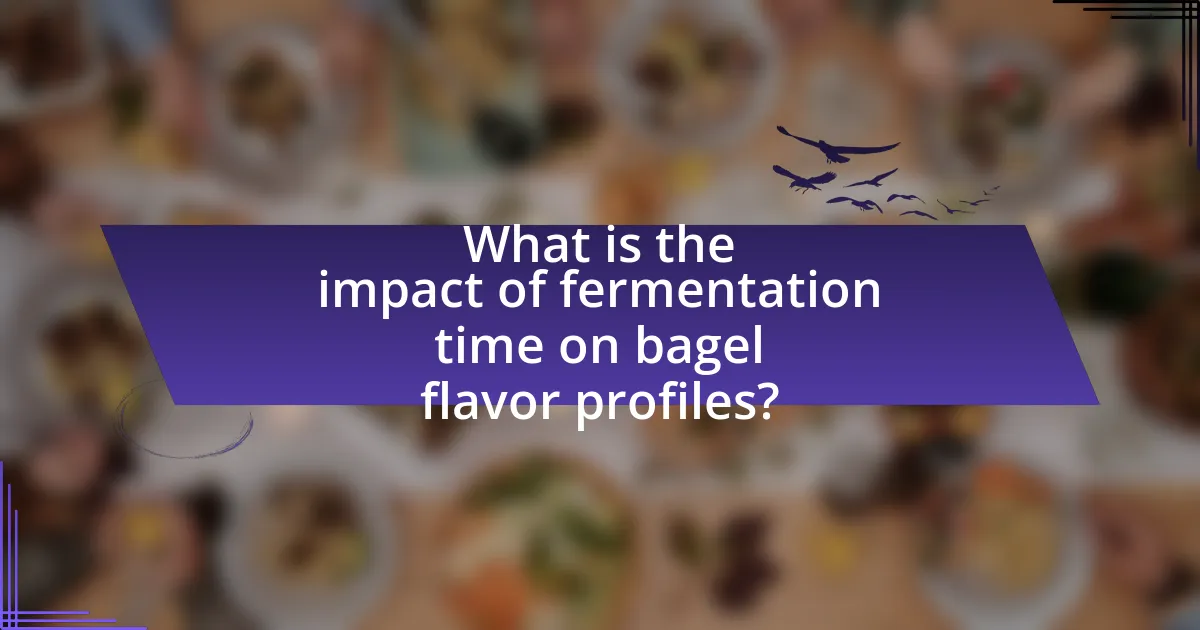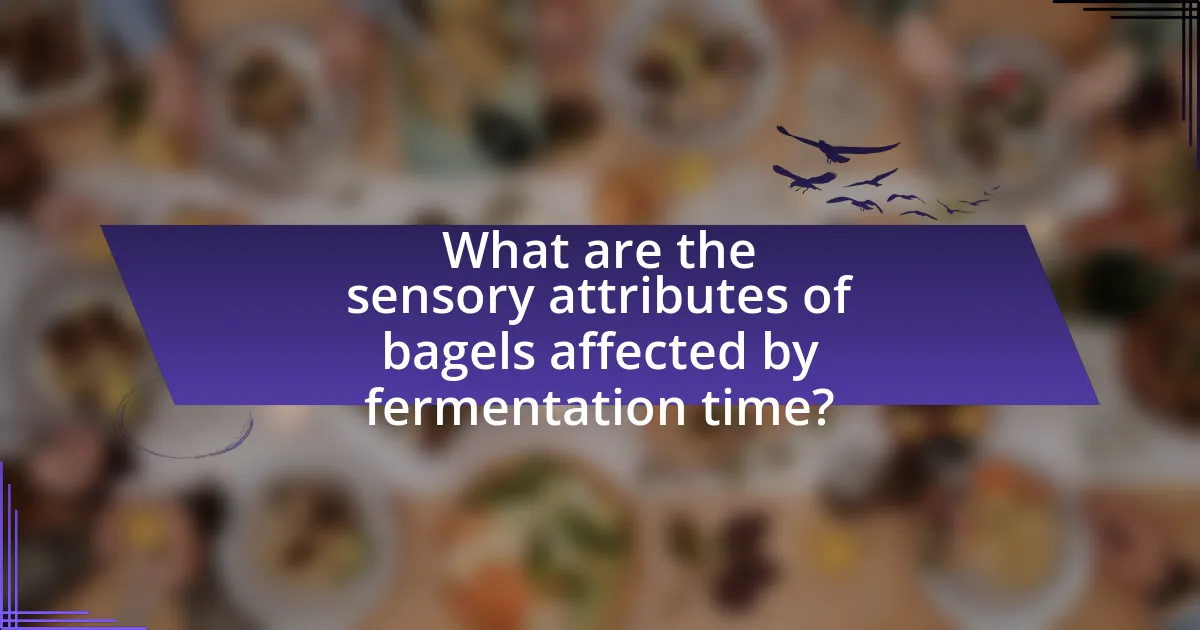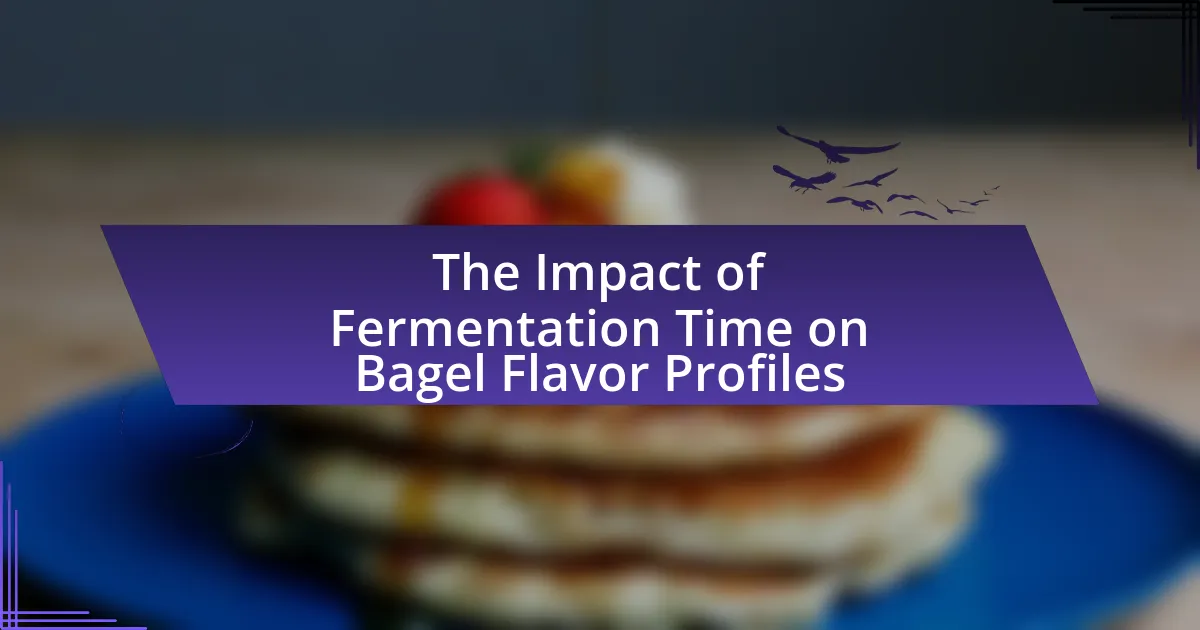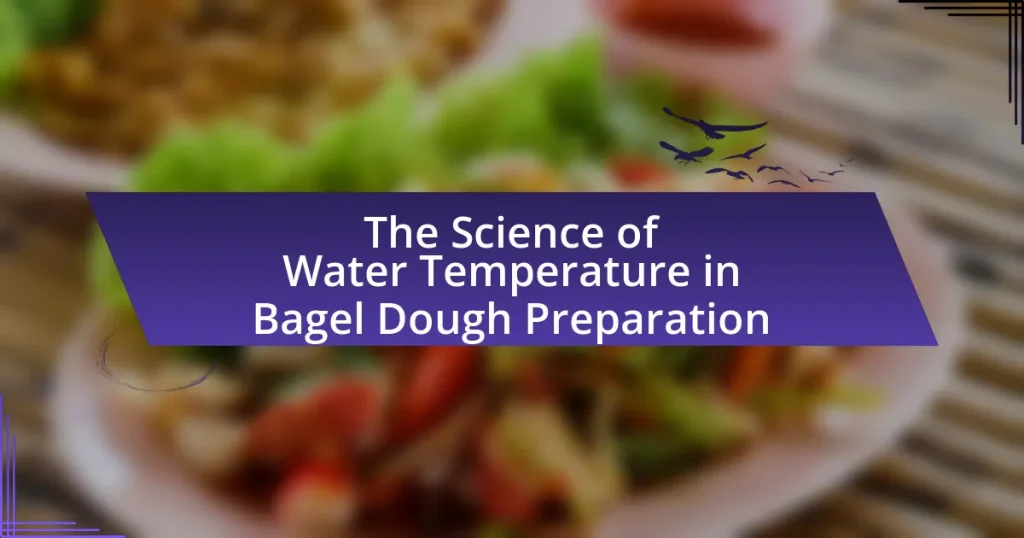The article examines the impact of fermentation time on bagel flavor profiles, highlighting how extended fermentation enhances flavor complexity and texture. It discusses the biochemical changes that occur during fermentation, including the production of organic acids and volatile compounds, which contribute to a richer taste and aroma. Additionally, the article explores various fermentation methods, the role of yeast, and the influence of temperature on fermentation duration. It emphasizes the importance of balancing fermentation time to achieve optimal flavor development while addressing common misconceptions and best practices for bakers to enhance consistency in bagel flavor profiles.

What is the impact of fermentation time on bagel flavor profiles?
Fermentation time significantly influences bagel flavor profiles by enhancing the development of complex flavors and aromas. Longer fermentation periods allow for greater enzymatic activity and the production of organic acids, which contribute to a more pronounced sourness and depth of flavor. Research indicates that a fermentation time of 12 to 24 hours can lead to optimal flavor development, as observed in studies that show increased lactic acid production correlating with extended fermentation, resulting in a richer taste profile.
How does fermentation time influence the taste of bagels?
Fermentation time significantly influences the taste of bagels by enhancing their flavor complexity and texture. Longer fermentation periods allow for the development of more nuanced flavors due to the breakdown of starches into sugars and the production of organic acids, which contribute to a tangy taste. Research indicates that a fermentation time of 12 to 24 hours can lead to a more pronounced flavor profile compared to shorter fermentation times, such as 1 to 2 hours, which typically result in a blander taste. This is supported by studies showing that extended fermentation enhances the Maillard reaction during baking, further enriching the bagel’s flavor.
What chemical changes occur during fermentation that affect flavor?
During fermentation, the primary chemical changes that affect flavor include the production of organic acids, alcohols, and volatile compounds. These changes result from the metabolic activities of yeast and bacteria, which convert sugars into these byproducts. For instance, lactic acid and acetic acid are produced, contributing to sourness and complexity in flavor. Additionally, the formation of esters and phenols during fermentation imparts fruity and spicy notes, enhancing the overall flavor profile of the bagel. Studies have shown that longer fermentation times can increase the concentration of these flavor compounds, leading to a more developed taste.
How does the duration of fermentation alter the texture of bagels?
The duration of fermentation significantly alters the texture of bagels by influencing gluten development and moisture retention. Longer fermentation times allow for more extensive gluten formation, resulting in a chewier and denser texture, which is characteristic of traditional bagels. Additionally, extended fermentation enhances the bagel’s ability to retain moisture, leading to a softer interior while maintaining a firm crust. Research indicates that a fermentation period of 12 to 24 hours can improve the overall texture by promoting enzymatic activity that breaks down starches, contributing to a more desirable mouthfeel.
Why is fermentation time critical in bagel production?
Fermentation time is critical in bagel production because it directly influences the development of flavor, texture, and overall quality of the bagels. During fermentation, yeast metabolizes sugars, producing carbon dioxide and alcohol, which contribute to the bagel’s unique taste and chewy texture. Research indicates that longer fermentation times enhance the complexity of flavors through the production of organic acids and esters, which are essential for achieving the desired flavor profile in bagels. For instance, a study published in the Journal of Food Science found that bagels fermented for extended periods exhibited significantly improved flavor characteristics compared to those with shorter fermentation times.
What role does yeast play in the fermentation process?
Yeast is a crucial microorganism in the fermentation process, primarily responsible for converting sugars into alcohol and carbon dioxide through anaerobic respiration. This biochemical reaction not only produces alcohol, which is essential in various food and beverage applications, but also generates carbon dioxide, contributing to the leavening of dough, such as in bagels. The activity of yeast during fermentation affects the flavor profile of the final product; for instance, longer fermentation times can enhance the development of complex flavors due to the production of various byproducts, including esters and phenols. Studies have shown that the specific strains of yeast used and the duration of fermentation significantly influence the sensory characteristics of baked goods, including bagels, thereby underscoring the importance of yeast in the fermentation process.
How does temperature affect fermentation time and flavor development?
Temperature significantly influences fermentation time and flavor development in bagels. Higher temperatures accelerate yeast activity, leading to shorter fermentation times, while lower temperatures slow down yeast metabolism, extending fermentation duration. For instance, at temperatures around 75°F (24°C), fermentation can take approximately 1-2 hours, whereas at cooler temperatures, such as 60°F (15°C), it may take several hours or overnight. Additionally, temperature affects the production of flavor compounds; warmer conditions enhance the development of esters and phenols, contributing to a more complex flavor profile. Conversely, cooler fermentation can result in milder flavors due to reduced yeast activity and slower metabolic processes.

What are the different fermentation methods used for bagels?
The different fermentation methods used for bagels include bulk fermentation, sponge fermentation, and retarded fermentation. Bulk fermentation involves allowing the dough to rise as a whole, which enhances flavor and texture through the development of gluten and fermentation by yeast. Sponge fermentation, on the other hand, uses a pre-ferment mixture of flour, water, and yeast that ferments before being mixed into the final dough, resulting in a more complex flavor profile. Retarded fermentation involves refrigerating the dough after mixing, which slows down yeast activity and allows for a longer fermentation period, contributing to a richer taste and improved crust characteristics. Each method impacts the bagel’s flavor and texture, with longer fermentation times generally leading to more pronounced flavors due to the increased production of organic acids and alcohols during fermentation.
How do traditional and modern fermentation techniques differ?
Traditional fermentation techniques rely on natural yeast and bacteria present in the environment, while modern fermentation techniques often utilize controlled, commercial yeast strains for consistency and speed. Traditional methods, such as sourdough fermentation, can take days to develop flavors due to the slow activity of wild yeast and lactic acid bacteria, resulting in complex flavor profiles. In contrast, modern techniques can achieve similar results in a fraction of the time, typically within hours, by using specific yeast strains that ferment sugars more rapidly. This difference in fermentation time and microbial control significantly influences the flavor profiles of products like bagels, with traditional methods often yielding richer, more nuanced flavors compared to the more uniform taste produced by modern methods.
What are the advantages of long fermentation versus short fermentation?
Long fermentation enhances flavor complexity and texture in bagels compared to short fermentation. During extended fermentation, enzymes break down starches into sugars, resulting in a richer, more nuanced flavor profile. Additionally, the longer fermentation allows for the development of gluten, leading to a chewier texture that is characteristic of high-quality bagels. Research indicates that bagels fermented for 12 to 24 hours exhibit significantly improved taste and chewiness compared to those fermented for only 1 to 2 hours, as the extended time allows for greater microbial activity and flavor development.
How does sourdough fermentation impact bagel flavor compared to commercial yeast?
Sourdough fermentation enhances bagel flavor by introducing complex, tangy notes and a deeper umami profile compared to commercial yeast. This occurs due to the presence of lactic acid bacteria and wild yeast in sourdough, which produce organic acids and other flavor compounds during fermentation. Research indicates that the longer fermentation time associated with sourdough allows for the development of these flavors, resulting in a more nuanced taste experience. In contrast, commercial yeast primarily contributes to a straightforward, yeasty flavor without the depth and complexity found in sourdough-fermented bagels.
What factors influence the choice of fermentation time in bagel making?
The choice of fermentation time in bagel making is influenced primarily by the desired flavor profile, dough hydration, and yeast activity. A longer fermentation time typically enhances the development of complex flavors due to increased enzymatic activity and acid production, which contribute to a more nuanced taste. Additionally, higher hydration levels in the dough can necessitate longer fermentation to achieve optimal gluten development and texture. Yeast activity also plays a crucial role; a more active yeast strain may require shorter fermentation times to prevent over-proofing, while a slower yeast can benefit from extended fermentation for flavor enhancement.
How do ingredient variations affect fermentation time?
Ingredient variations significantly affect fermentation time by altering the availability of nutrients and the activity of yeast. For instance, higher sugar concentrations can accelerate fermentation as yeast consumes sugar more rapidly, while increased salt levels can inhibit yeast activity, leading to longer fermentation times. Additionally, the type of flour used influences fermentation; bread flour, which has higher protein content, can create a stronger gluten network, potentially shortening fermentation time compared to all-purpose flour. Research indicates that these ingredient variations can lead to differences in fermentation duration ranging from a few hours to several days, directly impacting the flavor profiles of bagels.
What environmental conditions are optimal for fermentation?
Optimal environmental conditions for fermentation include a temperature range of 20 to 30 degrees Celsius, a controlled pH level around 4.5 to 6.0, and adequate oxygen supply for aerobic fermentation or an anaerobic environment for specific fermentation processes. These conditions promote the activity of yeast and bacteria, which are crucial for the fermentation process. Research indicates that yeast, such as Saccharomyces cerevisiae, thrives at these temperatures, leading to efficient sugar conversion into alcohol and carbon dioxide, essential for flavor development in products like bagels. Additionally, maintaining the appropriate pH helps to inhibit unwanted microbial growth, ensuring a successful fermentation process.

What are the sensory attributes of bagels affected by fermentation time?
Fermentation time significantly influences the sensory attributes of bagels, particularly their flavor, texture, and aroma. Longer fermentation periods enhance the development of complex flavors due to the production of organic acids and alcohols, resulting in a more pronounced sourness and depth of taste. Additionally, extended fermentation contributes to a chewier texture, as the gluten structure becomes more developed, and it can lead to a crustier exterior due to improved gas retention during baking. Research indicates that bagels fermented for longer durations exhibit a more robust aroma profile, attributed to the increased activity of yeast and bacteria, which produce volatile compounds.
How does fermentation time impact aroma and flavor complexity?
Fermentation time significantly enhances aroma and flavor complexity in bagels. Extended fermentation allows for the development of various volatile compounds, such as esters and phenols, which contribute to a richer aroma profile. Research indicates that longer fermentation periods can lead to increased enzymatic activity, resulting in the breakdown of starches into sugars, which not only enhances sweetness but also promotes the formation of complex flavor compounds through Maillard reactions during baking. Studies have shown that bagels fermented for longer durations exhibit a more pronounced depth of flavor and aroma compared to those with shorter fermentation times, confirming the critical role of fermentation duration in flavor development.
What specific flavor notes are enhanced by longer fermentation times?
Longer fermentation times enhance specific flavor notes such as sourness, nuttiness, and complexity in bagels. The extended fermentation allows for the development of organic acids, which contribute to a tangy flavor profile, while enzymatic activity breaks down starches into sugars, resulting in a richer, nuttier taste. Research indicates that the Maillard reaction, which occurs during longer fermentation, also adds depth and complexity to the flavor, creating a more pronounced and enjoyable eating experience.
How does fermentation time influence the overall mouthfeel of bagels?
Fermentation time significantly influences the overall mouthfeel of bagels by affecting gluten development and moisture retention. Longer fermentation allows for more extensive gluten formation, resulting in a chewier texture, which is characteristic of traditional bagels. Additionally, extended fermentation enhances the bagel’s ability to retain moisture, contributing to a softer interior while maintaining a firm crust. Research indicates that a fermentation period of 12 to 24 hours optimizes these qualities, leading to a desirable balance between chewiness and tenderness in the final product.
What are the common misconceptions about fermentation time in bagel making?
Common misconceptions about fermentation time in bagel making include the belief that longer fermentation always leads to better flavor and that fermentation time is the same for all types of bagels. In reality, while extended fermentation can enhance flavor complexity, it is not universally beneficial; over-fermentation can lead to undesirable textures and flavors. Additionally, different bagel recipes may require varying fermentation times based on ingredients and desired outcomes, indicating that a one-size-fits-all approach is inaccurate.
How do myths about fermentation time affect consumer expectations?
Myths about fermentation time significantly shape consumer expectations regarding the flavor and quality of bagels. Consumers often believe that longer fermentation times result in superior flavor, leading them to expect more complex and nuanced taste profiles in bagels that have undergone extended fermentation. This belief is supported by the fact that longer fermentation can enhance the development of flavor compounds, as seen in studies that indicate a correlation between fermentation duration and the production of organic acids and esters, which contribute to taste complexity. Consequently, when consumers encounter bagels that do not meet these heightened expectations, they may perceive them as inferior, regardless of the actual quality or flavor achieved through shorter fermentation processes.
What are the realities of fermentation time that bakers should know?
Fermentation time significantly influences the flavor and texture of bagels, with longer fermentation periods generally enhancing the complexity of flavors. Bakers should understand that fermentation allows yeast to produce carbon dioxide and organic acids, which contribute to the bagel’s taste and crust development. Research indicates that a fermentation time of 12 to 24 hours can lead to optimal flavor development, as seen in studies by the American Institute of Baking, which highlight that extended fermentation enhances the Maillard reaction, resulting in a richer flavor profile. Additionally, over-fermentation can lead to undesirable sourness and structural weaknesses, making it crucial for bakers to balance fermentation duration for the best results.
What best practices should bakers follow regarding fermentation time?
Bakers should adhere to specific best practices regarding fermentation time to enhance the flavor profiles of bagels. First, they should monitor the fermentation duration closely, typically allowing for a primary fermentation of 1 to 2 hours at room temperature, which promotes yeast activity and flavor development. Additionally, a cold fermentation of 12 to 24 hours in the refrigerator can further deepen the flavor by allowing enzymes to break down starches into sugars.
Furthermore, bakers should observe the dough’s volume and texture, ensuring it doubles in size during fermentation, which indicates proper yeast activity. Maintaining a consistent temperature is crucial, as warmer environments accelerate fermentation, while cooler temperatures slow it down, impacting flavor complexity.
Research indicates that longer fermentation times can lead to a more pronounced flavor due to the production of organic acids and alcohols, which contribute to the bagel’s overall taste. Therefore, bakers should experiment with varying fermentation times to find the optimal balance that enhances the flavor profile of their bagels.
How can bakers experiment with fermentation time to enhance flavor?
Bakers can experiment with fermentation time by adjusting the duration of both bulk fermentation and proofing stages to develop complex flavors in bagels. Longer fermentation times allow for increased enzymatic activity and the production of organic acids, which contribute to a more nuanced flavor profile. Research indicates that a bulk fermentation period of 12 to 24 hours at cooler temperatures can enhance the development of sour notes and improve the overall taste of the bagel. Additionally, varying proofing times can influence texture and crust characteristics, further enhancing flavor.
What tips can improve consistency in bagel flavor profiles through fermentation?
To improve consistency in bagel flavor profiles through fermentation, bakers should standardize fermentation time and temperature. Consistent fermentation conditions allow for predictable yeast activity and flavor development, which is crucial for achieving uniform taste. Research indicates that varying fermentation times can lead to significant differences in flavor compounds, such as organic acids and esters, which directly influence the bagel’s taste. For instance, a study published in the Journal of Food Science found that controlling fermentation duration to a specific range resulted in more stable flavor profiles across batches.



